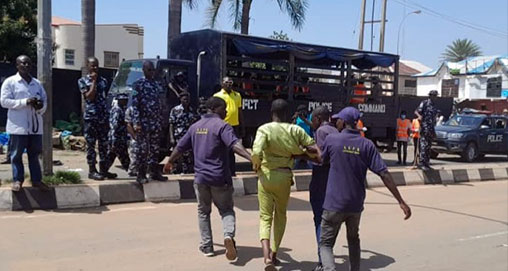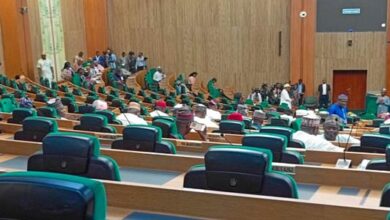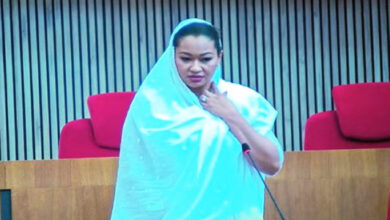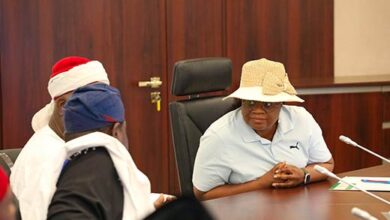Court Adjourns Suit Against Wike Over Alleged Rights Violations Of Abuja’s Vulnerable Residents To May 5

The Federal High Court in Abuja, on Tuesday, adjourned a suit filed on behalf of some vulnerable residents of the Federal Capital Territory (FCT), including scavengers, beggars, and petty traders, against the FCT Minister, Nyesom Wike, until 5 May for hearing.
A lawyer, Abba Hikima, who instituted the case on behalf of the vulnerable residents, sued the minister along with the Inspector-General of Police, Kayode Egbetokun, among others, demanding ₦500 million in damages over the alleged breach of their fundamental rights.
The judge, James Omotosho, adjourned the suit after the plaintiffs’ lawyer, Usman Chamo, informed the court that the Nigeria Security and Civil Defence Corps (NSCDC) had just served him with its counter-affidavit.
Mr. Chamo said he would need more time to file a response to the application.
The lawyers who appeared for the defence did not oppose the application, and the matter was adjourned until 5 May for hearing.
The News Agency of Nigeria (NAN) reports that a lawyer, Mr. Hikima, filed the suit marked: FHC/ABJ/CS/1749/2024 before Mr. Omotosho on behalf of the vulnerable residents.
Mr. Hikima, who is the plaintiff in the suit filed on 20 November 2024, said he instituted the legal action in the public interest for the protection of vulnerable citizens in Nigeria.
The applicant sued the FCT Minister, Mr. Wike; the Inspector-General of Police; the Director-General of the State Security Service (SSS); the NSCDC; the Attorney-General of the Federation (AGF); and the Federal Government of Nigeria to stop their alleged arbitrary arrest of vulnerable residents on the streets of Abuja.
He prayed for an award of ₦500 million as general and exemplary damages for the violation of the fundamental rights of the affected citizens.
He also prayed the court to declare that “the arbitrary arrest, detention without charges, harassment, and extortion of homeless persons, scavengers, petty traders, beggars, and other vulnerable Nigerians resident in the FCT constitute a violation of their fundamental rights.”
The rights, he said, are guaranteed under Sections 34, 35, 41, and 42 of the Nigerian Constitution.
“A declaration that the treatment of vulnerable citizens, including verbal harassment, physical threats, extortion, and detention without charge, constitutes inhumane and degrading treatment contrary to Section 34 of the 1999 Constitution (as amended).”
“A declaration that Nigerians, regardless of their economic status, place of birth, or appearance, have the liberty to move freely in the FCT, Abuja, including the liberty to sleep on public roads without let, permission, or hindrance whatsoever, in accordance with the spirit and purpose of Sections 35, 41, and 42 of the Constitution.”
He sought “an order directing the respondents to issue a public apology to the affected individuals and Nigerian citizens at large for the inhumane, arbitrary, and unconstitutional treatment meted out to them pursuant to the directive of the 1st respondent (Wike) dated 22 October 2024.”
“An order mandating the respondents to set in motion and implement immediate policies and reforms, including public education, for the realization of the fundamental human rights of vulnerable Nigerians residing in Nigeria.”
Mr. Hikima averred that on 12 November 2024, at about 11 p.m., on Ahmadu Bello Way in Abuja, he saw a motorcade of a joint task force, including security operatives and enforcement officers—comprising military and police personnel—arresting numerous individuals perceived to be homeless persons, scavengers, and beggars.
He alleged that those arrested included ice cream, sweet, and biscuit hawkers; petty traders conducting lawful businesses along the roadside; and persons dressed in ways reflecting economic hardship or appearing homeless.
According to him, the individuals were forcefully apprehended, verbally harassed, and subjected to physical threats in full view of passersby, thereby creating an atmosphere of fear and intimidation.
He said he felt devastated as a human rights lawyer and decided to trail the task force’s motorcade from a reasonable distance to Eagle Square, along Shehu Shagari Way, where they dropped off the victims.
He said he returned to the place where these persons were arrested and was able to get the contacts of some of the victims.





